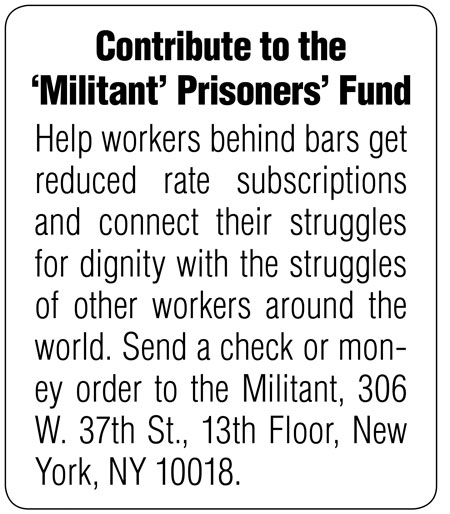

Vol. 78/No. 27 July 28, 2014
The fight began May 19 when the Militant received a notification from the warden dated Feb. 7, along with the rejected Dec. 30 issue that had been mailed to a subscriber in the prison. The notice said “this publication is deemed inappropriate for the orderly running of the institution due to it containing articles pertaining to Revolutionary Communist Party in the USA and the need to overthrow the system.”
On June 12, David Goldstein, of the firm Rabinowitz, Boudin, Standard, Krinsky & Lieberman, filed an administrative appeal with Paul Laird, regional director of the Federal Bureau of Prisons in Kansas City, Kansas, demanding the ban be reversed on the basis that it violated the First Amendment rights to freedom of speech and freedom of press of prisoners and the Militant. The ban also contravened Bureau of Prisons’ regulations, the appeal pointed out.
Those rules state the warden “may not reject a publication solely because its content is religious, philosophical, political, social or sexual, or because its content is unpopular or repugnant.” Among the other provisions violated was that rejection notices “must contain reference to the specific article(s) or material(s) considered objectionable.”
On July 7, Goldstein received notification that prison authorities had reversed their ruling. “We have reviewed your request along with a copy of the publication,” wrote Laird in a letter dated June 27 to Goldstein. “I understand this matter has been reevaluated at the institution-level.”
“USP Florence has reconsidered the prior rejection of ‘The Militant’ Vol. 77, No. 47,” John Oliver, warden of the high-security prison, wrote to Goldstein June 25. “The publisher may resend.”
“This is the latest of several recent victories against attempts to censor the paper in prison,” said Militant editor Doug Nelson in a July 12 interview. “This was the first time in at least half a century that a federal institution had interfered with delivery of the paper.” Over the past year the Militant has won administrative appeals against prison censorship in state penal facilities in Washington state and Florida.
“This has to do with defending workers’ rights — in and out of prison — against efforts by the rulers’ politicians, courts and jailers to chip away at constitutional protections won in past struggle,” Nelson said. “This is also about the right of prisoners to be political, to read what they want and discuss politics, and to resist prison abuses.”
The Militant has no affiliation to the Revolutionary Communist Party or its paper Revolution. Nor was there any mention of either in the issue rejected by the warden at Florence. “But if there were, on what basis can prison authorities ban a paper because it reports on some organization?” Nelson said in an interview after the appeal was filed. “We defend other papers like Prison Legal News, San Francisco Bay View, Legal Focus and Revolution in their battles against prison censorship.”
“I thank you for taking a stand in this matter along with us. And look forward to the victory that we will have!” the prisoner wrote to the Militant in early July, prior to knowing the case had been won.
“That’s great news,” said Paul Wright, editor of Prison Legal News, upon hearing of the latest victory, noting that the monthly magazine also continues to face censorship.
“We get a lot of rejection letters from the maximum security prison at Florence where we have a number of subscribers,” said Mary Ratcliff, editor of Bay View in a July 12 phone interview. “We need to challenge these rejections” so that authorities know “there will be a reaction other than just from the prisoners.”
Among those imprisoned on frame-up charges at the Florence supermax prison is H. Rap Brown, a former leader of the Black Panthers, currently known as Imam Jamil Al-Amin, Ratcliff pointed out. “The notorious indifference at Florence to prisoners’ health concerns is being exposed now that we learn he has cancer of the plasma cells after reporting incapacitating symptoms for over a year and getting no attention at all,” she wrote in a July 14 email to the Militant.
The Bay View and the Militant are part of an ongoing fight in California against attempts by state prison authorities to approve a rule that would ban publications that “indicate an association with groups that are oppositional to authority and society.”

|